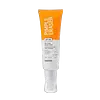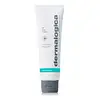What's inside
What's inside
 Key Ingredients
Key Ingredients

 Benefits
Benefits

 Concerns
Concerns

 Ingredients Side-by-side
Ingredients Side-by-side

Water
Skin ConditioningEthylhexyl Methoxycinnamate
UV AbsorberBenzophenone-3
UV AbsorberButyl Methoxydibenzoylmethane
UV AbsorberPhospholipids
Skin ConditioningButylene Glycol
HumectantCetearyl Alcohol
EmollientCeteareth-20
CleansingCaprylic/Capric Triglyceride
MaskingStearic Acid
CleansingPropylene Glycol
HumectantTitanium Dioxide
Cosmetic ColorantCetyl Alcohol
EmollientNiacinamide
SmoothingEthylhexyl Salicylate
UV AbsorberPhenoxyethanol
PreservativeCaprylyl Glycol
Emollient3-O-Ethyl Ascorbic Acid
Skin ConditioningMelaleuca Alternifolia Leaf Oil
AntioxidantBHT
AntioxidantCentella Asiatica Extract
CleansingPolygonum Cuspidatum Root Extract
AntioxidantScutellaria Baicalensis Root Extract
AstringentCamellia Sinensis Leaf Extract
AntimicrobialGlycyrrhiza Glabra Root Extract
BleachingChamomilla Recutita Flower Extract
MaskingRosmarinus Officinalis Leaf Extract
AntimicrobialWater, Ethylhexyl Methoxycinnamate, Benzophenone-3, Butyl Methoxydibenzoylmethane, Phospholipids, Butylene Glycol, Cetearyl Alcohol, Ceteareth-20, Caprylic/Capric Triglyceride, Stearic Acid, Propylene Glycol, Titanium Dioxide, Cetyl Alcohol, Niacinamide, Ethylhexyl Salicylate, Phenoxyethanol, Caprylyl Glycol, 3-O-Ethyl Ascorbic Acid, Melaleuca Alternifolia Leaf Oil, BHT, Centella Asiatica Extract, Polygonum Cuspidatum Root Extract, Scutellaria Baicalensis Root Extract, Camellia Sinensis Leaf Extract, Glycyrrhiza Glabra Root Extract, Chamomilla Recutita Flower Extract, Rosmarinus Officinalis Leaf Extract
Water
Skin ConditioningHomosalate
Skin ConditioningBenzophenone-3
UV AbsorberEthylhexyl Salicylate
UV AbsorberButylene Glycol
HumectantButyl Methoxydibenzoylmethane
UV AbsorberPPG-3 Benzyl Ether Ethylhexanoate
EmollientNylon-12
Aluminum Starch Octenylsuccinate
AbsorbentArachidyl Alcohol
EmollientStearic Acid
CleansingPolysorbate 80
EmulsifyingLeuconostoc/Radish Root Ferment Filtrate
AntimicrobialCarthamus Tinctorius Oleosomes
EmollientCamellia Sinensis Leaf Extract
AntimicrobialCitrus Grandis Fruit Extract
AstringentAesculus Hippocastanum Seed Extract
Skin ConditioningAmmonium Glycyrrhizate
MaskingEnantia Chlorantha Bark Extract
Skin ConditioningPanthenol
Skin ConditioningZinc Gluconate
Skin ConditioningCaffeine
Skin ConditioningBiotin
AntiseborrhoeicOleanolic Acid
Skin ConditioningTocopheryl Acetate
AntioxidantYeast Extract
Skin ConditioningNiacinamide
SmoothingVinyl Dimethicone/Methicone Silsesquioxane Crosspolymer
Hydroxyethyl Acrylate/Sodium Acryloyldimethyl Taurate Copolymer
Emulsion StabilisingIsohexadecane
EmollientPolysorbate 60
EmulsifyingBehenyl Alcohol
EmollientArachidyl Glucoside
EmulsifyingAcrylates/C10-30 Alkyl Acrylate Crosspolymer
Emulsion StabilisingXanthan Gum
EmulsifyingSorbitan Stearate
EmulsifyingCetyl Alcohol
EmollientGlyceryl Stearate Se
EmulsifyingGluconic Acid
Propylene Glycol
HumectantSodium Benzoate
MaskingPotassium Sorbate
PreservativeDisodium EDTA
Sodium Hydroxide
BufferingLimonene
PerfumingCitral
PerfumingWater, Homosalate, Benzophenone-3, Ethylhexyl Salicylate, Butylene Glycol, Butyl Methoxydibenzoylmethane, PPG-3 Benzyl Ether Ethylhexanoate, Nylon-12, Aluminum Starch Octenylsuccinate, Arachidyl Alcohol, Stearic Acid, Polysorbate 80, Leuconostoc/Radish Root Ferment Filtrate, Carthamus Tinctorius Oleosomes, Camellia Sinensis Leaf Extract, Citrus Grandis Fruit Extract, Aesculus Hippocastanum Seed Extract, Ammonium Glycyrrhizate, Enantia Chlorantha Bark Extract, Panthenol, Zinc Gluconate, Caffeine, Biotin, Oleanolic Acid, Tocopheryl Acetate, Yeast Extract, Niacinamide, Vinyl Dimethicone/Methicone Silsesquioxane Crosspolymer, Hydroxyethyl Acrylate/Sodium Acryloyldimethyl Taurate Copolymer, Isohexadecane, Polysorbate 60, Behenyl Alcohol, Arachidyl Glucoside, Acrylates/C10-30 Alkyl Acrylate Crosspolymer, Xanthan Gum, Sorbitan Stearate, Cetyl Alcohol, Glyceryl Stearate Se, Gluconic Acid, Propylene Glycol, Sodium Benzoate, Potassium Sorbate, Disodium EDTA, Sodium Hydroxide, Limonene, Citral
 Reviews
Reviews

Ingredients Explained
These ingredients are found in both products.
Ingredients higher up in an ingredient list are typically present in a larger amount.
You probably know this ingredient as Oxybenzone, a sunscreen ingredient. It is a broad-spectrum sunscreen ingredient, meaning it can protect the skin against UVB and short UVA rays. The absorption range is 270-350 nm with peak absorption at 288 and 350 nm.
This chemical ingredient protects your skin by using chemical reactions to convert UV rays into heat and energy. UV absorbers may absorb both UVA and UVB rays. It is often combined with other sunscreen ingredients to help with stability.
Ongoing research is looking into whether oxybenzone causes skin irritation and sensitivity. However, it has been shown to trigger contact dermatitis in some studies.
Oxybenzone is allowed in certain concentrations by many countries. It is allowed up to 6% in the US, and Canada, 5% in Japan, and 10% in Australia. Other countries and regions of the US have banned this ingredient to protect coral reefs and marine ecosystems. These places include Hawaii, Key West, US Virgin Islands, marine parks in Thailand, Aruba, and Palau.
The EU currently allows the following maximum concentrations:
Studies show conflicting results about oxybenzone being absorbed into the human body. The Swedish Research Institute has advised careful use of this ingredient by pregnant women and children. We always recommend speaking with a professional if you have concerns about this ingredient and your health.
Learn more about Benzophenone-3Also known as Avobenzone, this ingredient is a chemical sunscreen filter that provides protection in the UV-A range.
Avobenzone is globally approved and is the most commonly used UV-A filter in the world.
Studies have found that avobenzone becomes ineffective when exposed to UV light (it is not photostable; meaning that it breaks down in sunlight). Because of this, formulations that include avobenzone will usually contain stabilizers such as octocrylene.
However, some modern formulations (looking at you, EU!) are able to stabilize avobenzone by coating the molecules.
Avobenzone does not protect against the UV-B range, so it's important to check that the sunscreen you're using contains other UV filters that do!
The highest concentration of avobenzone permitted is 3% in the US, and 5% in the EU.
Learn more about Butyl MethoxydibenzoylmethaneButylene Glycol (or BG) is used within cosmetic products for a few different reasons:
Overall, Butylene Glycol is a safe and well-rounded ingredient that works well with other ingredients.
Though this ingredient works well with most skin types, some people with sensitive skin may experience a reaction such as allergic rashes, closed comedones, or itchiness.
Learn more about Butylene GlycolCamellia Sinensis Leaf Extract is derived from the leaves of the tea plant. Black tea, green tea, and oolong tea are all harvested from this plant.
This ingredient has many skin benefits:
This ingredient contains polyphenols, a strong antioxidant. Antioxidants help fight off molecules that damage skin cells.
On top of that, the antioxidants in green tea neutralize free-radicals from the sun. This gives the skin some extra UV protection, but should not replace sunscreen.
Many components of tea have anti-inflammatory properties.
Polyphenols and L-theanine help soothe the skin and reduce irritation. The caffeine in Camellia Sinensis Leaf Extract helps calm inflamed blood vessels.
Other compounds found in tea include: Vitamin Bs, linoleic acid, magnesium, calcium, iron, and zinc.
Research has shown both drinking Camellia Sinensis Leaf Tea and applying it to the skin can help boost skin elasticity and hydration. Studies also show using tea extract may reduce sebum, or oil, production.
Learn more about Camellia Sinensis Leaf ExtractCetyl Alcohol is a fatty alcohol. Fatty Alcohols are most often used as an emollient or to thicken a product.
Its main roles are:
Though it has "alcohol" in the name, it is not related to denatured alcohol or ethyl alcohol.
The FDA allows products labeled "alcohol-free" to have fatty alcohols.
Learn more about Cetyl AlcoholEthylhexyl Salicylate is an organic compound used to block UV rays. It primarily absorbs UVB rays but offers a small amount of UVA protection as well.
Commonly found in sunscreens, Ethylhexyl Salicylate is created from salicylic acid and 2-ethylhexanol. You might know salicylic acid as the effective acne fighter ingredient and BHA.
The ethylhexanol in this ingredient is a fatty alcohol and helps hydrate your skin, similar to oils. It is an emollient, which means it traps moisture into the skin.
According to manufacturers, Ethylhexyl Salicylate absorbs UV wavelength of 295-315 nm, with a peak absorption at 307-310 nm. UVA rays are linked to long term skin damage, such as hyperpigmentation. UVB rays emit more energy and are capable of damaging our DNA. UVB rays cause sunburn.
Learn more about Ethylhexyl SalicylateNiacinamide is a multitasking form of vitamin B3 that strengthens the skin barrier, reduces pores and dark spots, regulates oil, and improves signs of aging.
And the best part? It's gentle and well-tolerated by most skin types, including sensitive and reactive skin.
You might have heard of "niacin flush", or the reddening of skin that causes itchiness. Niacinamide has not been found to cause this.
In very rare cases, some individuals may not be able to tolerate niacinamide at all or experience an allergic reaction to it.
If you are experiencing flaking, irritation, and dryness with this ingredient, be sure to double check all your products as this ingredient can be found in all categories of skincare.
When incorporating niacinamide into your routine, look out for concentration amounts. Typically, 5% niacinamide provides benefits such as fading dark spots. However, if you have sensitive skin, it is better to begin with a smaller concentration.
When you apply niacinamide to your skin, your body converts it into nicotinamide adenine dinucleotide (NAD). NAD is an essential coenzyme that is already found in your cells as "fuel" and powers countless biological processes.
In your skin, NAD helps repair cell damage, produce new healthy cells, support collagen production, strengthen the skin barrier, and fight environmental stressors (like UV and pollution).
Our natural NAD levels start to decline with age, leading to slower skin repair, visible aging, and a weaker skin barrier. By providing your skin niacinamide, you're recharging your skin's NAD levels. This leads to stronger, healthier, and younger looking skin.
Another name for vitamin B3 is nicotinamide. This vitamin is water-soluble and our bodies don't store it. We obtain Vitamin B3 from either food or skincare. Meat, fish, wheat, yeast, and leafy greens contain vitamin B3.
The type of niacinamide used in skincare is synthetically created.
Learn more about NiacinamidePropylene Glycol is an odorless, colorless liquid. As a humectant, it helps skin retain moisture. It also aids in delivering active ingredients.
Another role of this ingredient is preventing a product from melting or freezing. Propylene glycol also adds antimicrobrial properties to a product, elongating product lifespan.
This ingredient is considered an organic alcohol and commonly added into both cosmetics and foods.
Those with sensitive skin or conditions may develop a rash when using this ingredient.
Learn more about Propylene GlycolStearic Acid is a fatty acid. It is an emollient, emulsifier, and texture enhancer.
As an emollient, stearic acid helps soften skin. It aids the skin's protective barrier by preventing water loss. It also provides a gentle cleansing effect without stripping away natural oils.
Stearic acid may also be used to enhance the texture of products. It can add volume and stabilize ingredients such as water and oil. This can help water and oil ingredients from separating.
Sources of stearic acid include animal or vegetable fats/oils such as coconut or shea. It can be naturally found in butter, cocoa butter, shea butter, vegetable fats, and animal tallow.
This ingredient may not be Malassezia folliculitis, or fungal-acne safe.
Learn more about Stearic AcidWater. It's the most common cosmetic ingredient of all. You'll usually see it at the top of ingredient lists, meaning that it makes up the largest part of the product.
So why is it so popular? Water most often acts as a solvent - this means that it helps dissolve other ingredients into the formulation.
You'll also recognize water as that liquid we all need to stay alive. If you see this, drink a glass of water. Stay hydrated!
Learn more about Water